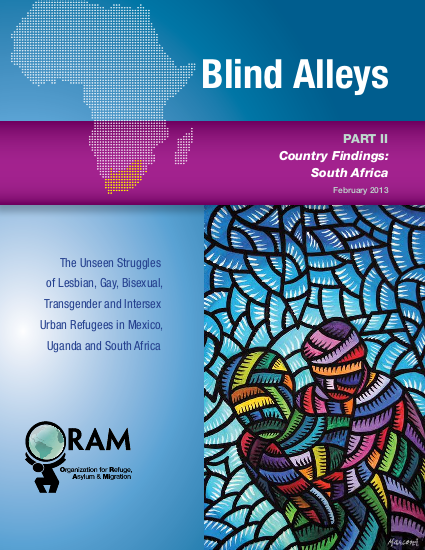
South Africa is home to one of the most progressive constitutions in the world, as well as an exemplary refugee status determination law. However, this progressive legislation is undermined by a severely overburdened asylum system and widespread discrimination against outsiders and the “sexually and gender nonconforming” (SGN) community. These challenges prevent SGN refugees from accessing rights and services to which they are entitled, impact their ability to integrate into South African society, and even make it difficult to survive.
To better understand these challenges and develop solutions, ORAM – Organization for Refuge, Asylum & Migration, conducted a series of interviews with SGN refugees, NGO staff, and other stakeholders. These interviews confirmed reports of victimization and discrimination against SGN refugees and asylum seekers by both official and non-state actors. Many of the refugees who participated in our study reported experiences of arbitrary arrests, harassment, and discrimination from the authorities. A few interviewees reported needing to bribe security guards or other government officials in order to access the refugee status determination system. While xenophobia was cited as the primary motivation for the abuse, some interviewees felt compelled to hide their sexual orientation or gender identity from government officials due to perceived homophobia.
These SGN interviewees also reported abuse and marginalization at the hands of non-state actors. These participants suffered mistreatment primarily while waiting in queues outside the Refugee Reception Offices (RROs) or while living among communities comprised of refugees from their countries of origin. Discrimination within these refugee communities hinders SGN individuals’ abilities to form social and community bonds and results in isolation and exclusion. Xenophobic violence and rampant discrimination against SGN refugees and asylum seekers also impacts their ability to find work and to meet their needs for basic subsistence. Unable to find jobs, some SGN refugees turn to sex work in order to survive.
SGN refugees, and particularly transgender individuals, also face obstacles in obtaining housing. While their experiences with shelters were mixed, some interviewees reported suffering xenophobic violence, prejudice, and crime. In some cases, SGN refugees face the possibility of eviction if their landlords, family, or flatmates become aware of their sexual orientation or gender identity. Interviewees also reported barriers to accessing basic health care, as well as discrimination in the provision of these services. Many face prejudice in public health facilities and abuse from healthcare providers due to their status as foreigners.
While these interviews revealed a number of problems faced by SGN refugees in South Africa, they also provided much needed guidance as to how protection of this vulnerable population can be improved. To this end, ORAM has developed a detailed set of recommendations aimed at improving the quality of services provided to SGN refugees and closing those protection gaps which currently exist.
Resource collections
- Accountability to affected populations (AAP)
- UN Habitat - Urban Response Collection
- Urban Response - Urban Crisis Preparedness and Risk Reduction
- Urban Response Collection - Community Engagement and Social Cohesion
- Urban Response Collection - Economic Recovery
- Urban Response Collection - Environment and Climate Change
- Urban Response Collection - Housing, Land and Property
- Urban Response Collection - Urban Crisis Response, Recovery and Reconstruction
- Urban Response Collection - Urban Resilience